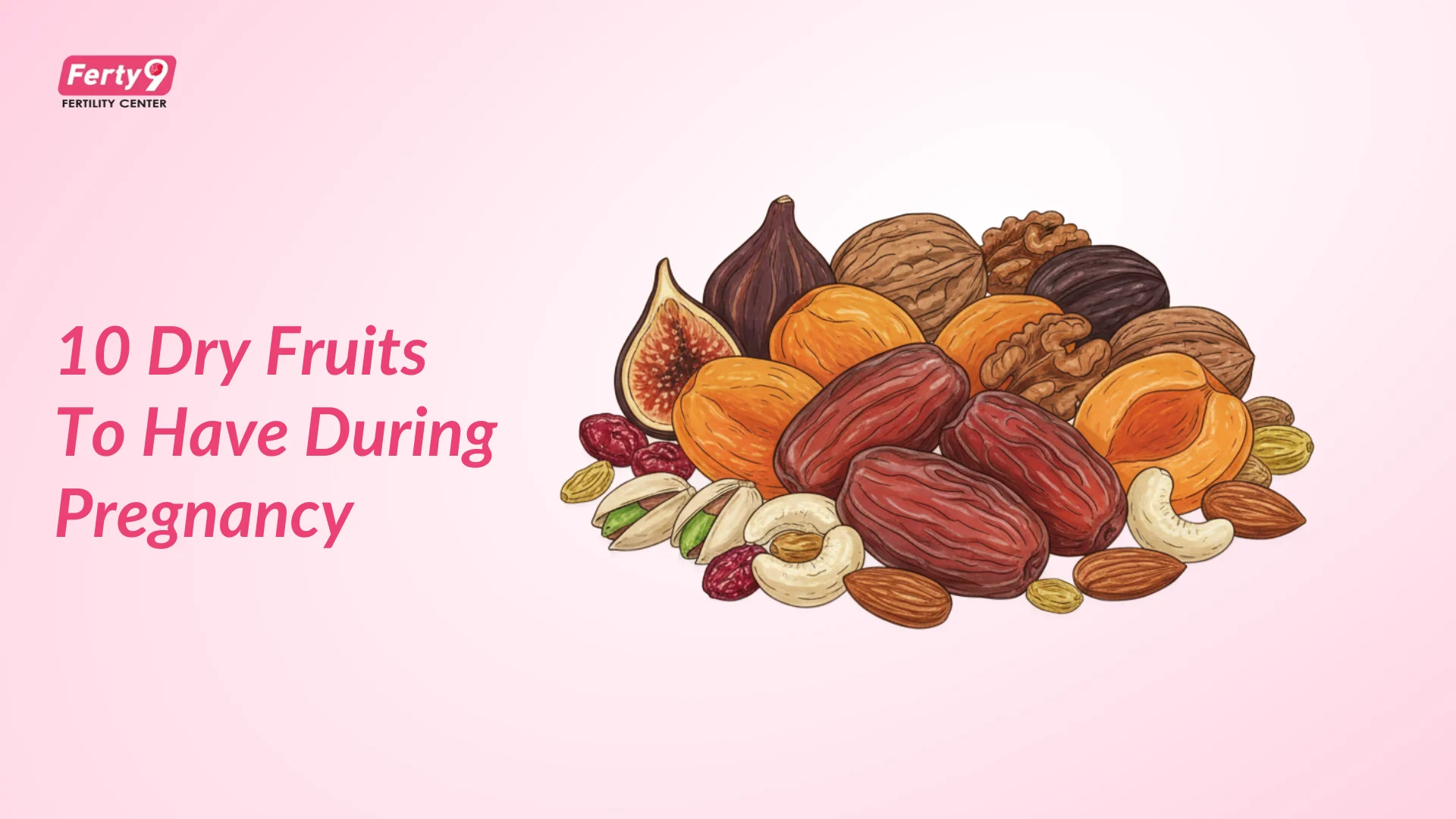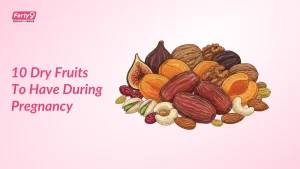Pregnancy is a beautiful journey, but it is also a time when your body demands extra care and nutrition. What you eat directly impacts your health and the growth of your little one. While we often focus on big meals, snacking smart is just as important. This is where dry fruits come in—they are nature’s little powerhouses of nutrition.
Packed with essential nutrients like iron, calcium, folate, and healthy fats, dry fruits are a convenient way to meet your increased nutritional needs. Eating them in moderation can help boost your energy, keep your hemoglobin levels up, and even tackle common pregnancy woes like morning sickness, fatigue, and constipation.
In this guide, we will explore the 10 best dry fruits for pregnant women, their specific benefits, and how much you should eat daily to ensure a healthy pregnancy journey.
Why Dry Fruits Are Important During Pregnancy
You might wonder, “Why are elders in Indian families always insisting on eating soaked almonds or walnuts?” It’s because dry fruits offer concentrated nutrition in small packages.
- Nutrient-Dense: They are rich in proteins, fiber, and essential vitamins that are vital for the baby’s growth.
- Healthy Calories: Pregnancy requires extra energy. Dry fruits provide “good calories” that boost stamina without the empty sugars found in junk food.
- Aids Digestion: Hormonal changes often lead to constipation in pregnancy. The high fiber content in dry fruits helps keep your digestion smooth.
- Supports Fetal Development: Ingredients like Omega-3 fatty acids and folic acid are critical for developing your baby’s brain and nervous system.
- Bone & Immunity Boost: They are loaded with minerals that strengthen your bones and build immunity for both mother and child.
Nutritional Value of Dry Fruits for Pregnant Women
Here is a simple breakdown of why these nuts and fruits are essential for you:
| Nutrient | Role in Pregnancy | Common Dry Fruit Source |
| Iron | Prevents anemia and keeps blood healthy | Dates, Raisins |
| Calcium | Builds baby’s bones and teeth | Figs (Anjeer), Almonds |
| Omega-3 | Supports baby’s brain and eye development | Walnuts |
| Fiber | Relieves constipation and aids digestion | Prunes, Apricots, Figs |
| Folate | Prevents birth defects in the baby | Almonds, Walnuts |
10 Best Dry Fruits To Eat During Pregnancy
Here is a list of the top superfoods you should include in your pregnancy diet plan.
1. Almonds (Badam)
Almonds are a pregnancy staple in Indian households. They are loaded with protein, calcium, and magnesium.
- Benefits: They strengthen bones and support the development of the baby’s brain and nervous system.
- Recommended: 5–6 almonds daily.
- Tip: Soak them overnight and peel the skin before eating for better digestion.
2. Walnuts (Akhrot)
Resembling the shape of a brain, walnuts are indeed excellent for brain health. They are one of the best plant sources of Omega-3 fatty acids.
- Benefits: Vital for the baby’s brain and eye development. They also help reduce oxidative stress in the mother.
- Recommended: 1–2 whole walnuts daily.
3. Dates (Khajoor)
Dates are a natural sweetener and an instant energy booster.
- Benefits: High in iron and potassium, they help maintain hemoglobin levels and fight off pregnancy fatigue. They are also known to help prepare the uterus for labor in the later stages.
- Recommended: 2–3 dates per day.
4. Raisins (Kishmish)
If you have a sweet tooth, raisins are a healthy way to satisfy it.
- Benefits: They are incredibly rich in iron, making them great for preventing anemia. The fiber content also helps prevent constipation.
- Recommended: 6–8 raisins daily (soaking them makes them even healthier).
5. Figs (Anjeer)
Figs are excellent for digestive health and bone strength.
- Benefits: They regulate blood pressure and blood sugar levels. Their high calcium content supports the skeletal growth of the fetus.
- Recommended: 1–2 dried figs daily.
6. Cashews (Kaju)
Cashews are creamy, delicious, and packed with energy.
- Benefits: They provide healthy fats and protein, which are good for heart health and keeping your energy levels steady.
- Recommended: 4–5 cashews daily.
- Note: Avoid salted or fried cashews to prevent high blood pressure.
7. Pistachios (Pista)
Pistachios are a tasty source of protein, iron, and Vitamin B6.
- Benefits: Vitamin B6 is known to help with morning sickness, while iron aids in healthy blood formation.
- Recommended: 5–6 unsalted pistachios daily.
8. Dried Apricots (Khubani)
These orange delights are packed with beta-carotene (Vitamin A), iron, and fiber.
- Benefits: They help maintain healthy vision for the baby and ensure smooth bowel movements for the mother.
- Recommended: 2–3 dried apricots daily.
9. Prunes (Dried Plums)
Prunes are widely known as a natural remedy for digestive issues.
- Benefits: If you are struggling with severe constipation (a common issue in pregnancy), prunes are your best friend. They also contain potassium for cell repair.
- Recommended: 1–2 prunes daily.
10. Dried Cranberries
Pregnancy changes can sometimes make women prone to Urinary Tract Infections (UTIs).
- Benefits: Cranberries are rich in Vitamin C and antioxidants that boost immunity and help prevent UTIs.
- Recommended: A small handful daily (choose unsweetened versions if possible).
How to Include Dry Fruits in Your Pregnancy Diet
Eating them raw is great, but you can make it more interesting:
- Soaking: Soaking almonds, raisins, figs, and walnuts overnight removes “anti-nutrients” and makes them easier to digest.
- Smoothies & Shakes: Add dates or figs to your morning milk or smoothie for natural sweetness.
- Porridge & Yogurt: Top your oatmeal, daliya, or curd with chopped nuts for extra crunch.
- Traditional Laddoos: Homemade dry fruit laddoos (using jaggery instead of sugar) are a nutritious snack.
How Much Dry Fruit Is Safe During Pregnancy?
While they are healthy, “too much of a good thing” applies here. Dry fruits are high in calories and natural sugars.
- Ideal Portion: About 25–30 grams per day (roughly one small handful of mixed nuts).
- Risks of Overeating: Excessive consumption can lead to unwanted weight gain, bloating, diarrhea (due to high fiber), and sugar spikes (especially with dates and raisins).
Always consult your gynecologist or dietitian at Ferty9 before making major changes, especially if you have Gestational Diabetes.
Dry Fruits to Be Cautious About
Not all dry fruit products are pregnancy-friendly.
- Avoid Salted Nuts: High sodium can lead to water retention and high blood pressure.
- Avoid Sugar-Coated/Candied Fruits: These are essentially candy and offer little nutritional value.
- Check for Allergies: If you have a family history of nut allergies, consult your doctor first.
Homemade Dry Fruit Mix Recipe
Create your own “Pregnancy Power Mix” to keep handy for hunger pangs.
Ingredients:
- 5 Almonds
- 2 Walnuts
- 4 Raisins
- 1 Fig (chopped)
- 2 Pistachios
Method: You can eat these soaked (best for digestion) or lightly dry-roast the nuts (almonds, walnuts, pistachios, cashews) for a crunchy snack. Mix them in a small jar. This ensures you get a variety of nutrients without overeating one specific type.
Benefits of Regular Consumption
Making dry fruits a daily habit can:
- Prevent Anemia: By boosting iron levels.
- Increase Stamina: Keeping you active throughout the trimesters.
- Support Baby’s Brain: Thanks to healthy fats like Omega-3.
- Build Strong Bones: For both you and the baby.
- Ease Digestion: Reducing the discomfort of constipation.
Summary
Dry fruits are a simple, delicious, and nutrient-dense way to support your body and your growing baby during pregnancy. Whether you crave something sweet like dates or crunchy like almonds, there is a dry fruit to meet every need.
Remember, the key is moderation and variety. Enjoy a handful daily, stay hydrated, and focus on a balanced diet.
For personalized diet plans or if you have specific health concerns like diabetes or hypertension during pregnancy, please consult the experts at Ferty9 Fertility Center.





























